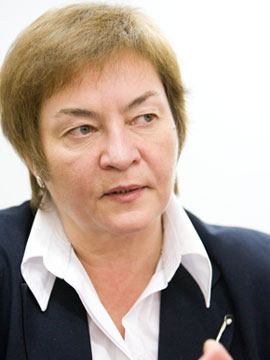BAJ Leaders Comment Amendments to Media Law (Link Added)
They underline that BAJ was not included in the process of discussing the draft project.
NOTE: the full text of the amendements was published on December 19 here (Russian language).
On December 17, the House of Representatives adopted amendments to the Law on Mass Media. The text of the law has not been published yet, although the amendments enter into legal force on January 1. Liliya Ananich, the Minister of Information, gave a press conference providing the only information from the amendments.
Andrei Bastunets, deputy chair of BAJ, lawyer:
All changes are aimed to increase government control over informational sphere
.jpg)
“According to the information that we have now, the amendments to the Mass Media Law can be divided into three main blocs.
The first one is reducing foreign share in statute funds of editorial offices of the media. Today there is the limit of 30%, and it’s been restricted to 20% only. I don’t see much sense in it, because it will not touch upon the main players in the market. I mean the Belarusian mass media with the Russian capital. The limit was imposed in 2008 and did not cover editorial offices registered before the adoption of the law. I don’t think the situation will change now.
The second one is creation of state registers of distributors of print products, of Radio and TV mass media. Up till now, such registers have been created for book publishers and book distributors. Basically, these registers have become grounds for pressure – as the case with the Lohvinau bookstore, for example, which has failed to get registered there. Now, all their yearly earnings might be taken away. So, there is a possibility that the Ministry of Information will abuse this provision. But for me there is a major question – what will happen to distributors of unregistered media? Is there a chance to get registered for self-publishers who also distribute their products by themselves and who are not economic entities? And what can be done with this?
The third bloc deals with online resources. The Ministry of Information has yet abstained from registration of Internet mass media, but they will have to deal with other norms of the Media Law. But still it is not clear whether the norms will touch upon the websites in by domain only, or it will reach other resources. Sanctions might include, first, restricting access to online resources after two warnings within a year. The procedure of imposing restrictions will be developed by the Ministry of Information and the Ministry of Communications. That is, it looks that the norm is similar to the norm concerning print products, but it is the court who decides [to close down] print products, and not the Ministry of Information. /…/
For now, we can already say that all the changes have been made to increase governmental control over the informational sphere. Now it concerns distributors of mass media as well as online resources.

Zhanna Litvina, chairperson of BAJ:
The decision to urgently enter amendments to the law was made by the executive authorities.
It is hard to comment on the text of the document as we have not seen it yet, but we can make some conclusions from what was said.
For instance, I paid attention to the fact that other state bodies, not only the Information Ministry, have the right to analyze online information and enter their suggestions. And this can end up in website blocking. It means that the scale of online surveillance will expand significantly.
I would view the adoption of the amendments with reference to earlier statements of heads of different structures. For example, in December Ihar Shunevich, the Minister of Home Affairs voiced the necessity to amend the law concerning the Internet – in particular, to prevent all users from accessing websites with “restricted access”.
It is clear that these amendments will be followed by a number of documents, legal act, and there is no hope that they will simplify information flow in Belarus.
Remarkably, the respective Commission of the House of Representatives replied to BAJ in October 2014 that there was no need to amend legislation of Belarus in the sphere of free expression.
The conclusion we make is that MPs don’t take any independent steps without consulting it with the executive authorities. And I think that the decision to urgently enter amendments into the law was made by the executive authorities.
But, the main point for me is the total ignore of previous appeals of Belarusian and international journalistic community that any changes in legislation on mass media must be discussed with the public, because it is topic of public importance.
In particular, a year ago our organization addressed the question to the Ministry of Information and Usevalad Yancheuski, head of the chief ideological department of the President’s Administration. Mr Yancheuski replied that the Ministry of information has been charged with the task to bring up the issue “for public discussion, with the participation of bodies and organizations concerned, and also to involve representatives of journalistic organizations and online communities.” The Ministry assured us that wide public discussion will be launched in case draft law appears.
Also, it is not clear why the expert potential of OSCE has not been involved – there were so many discussions, and recommendations. It is hard to say how much they are presented in the law, but it seems that nobody remembered this.
Reform of media sphere has been in demand for very long. Especially, bearing in mind the Russian-Ukrainian conflict when we turned out helpless in front of manipulations of information. But the steps taken by the authorities look like not those needed to cure the helpless state of the informational space of the country or to solve the issues of informational safety.





